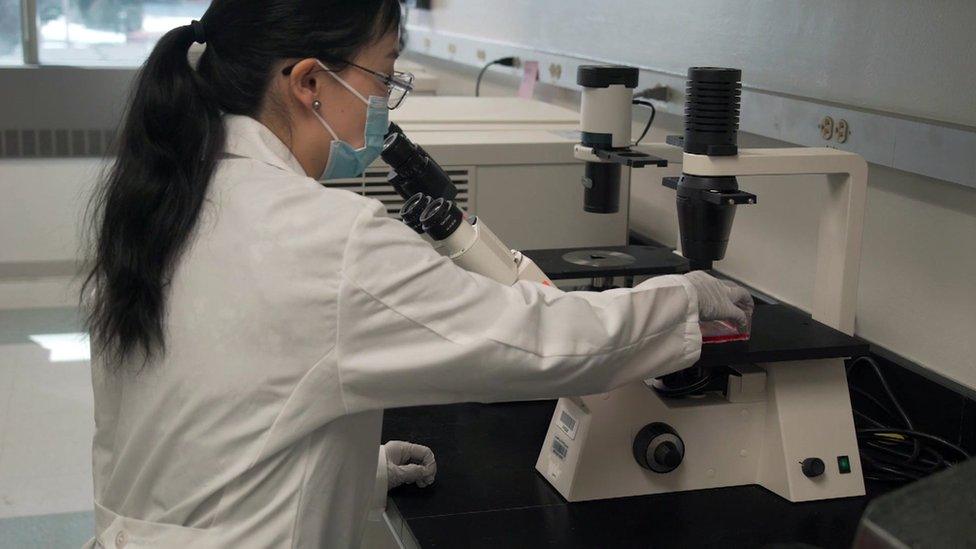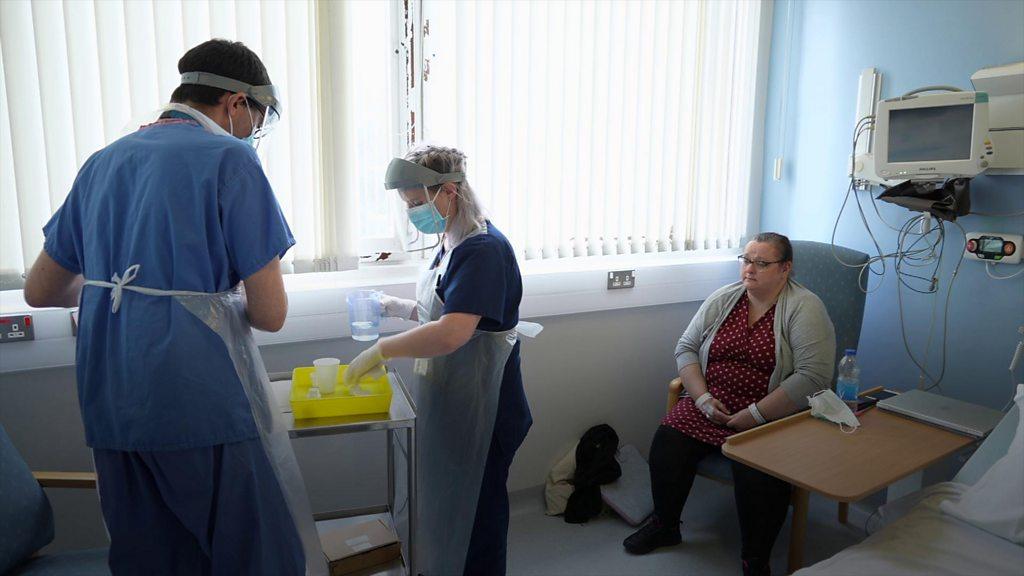Covid: First UK patients given take-at-home pill
- Published

Molnupiravir was the first oral antiviral treatment for Covid to report clinical trial results.
The first at-home treatment for Covid has been given to patients in the UK as part of a major national study.
Molnupiravir will be tested on 10,000 people at risk of serious illness in research led by University of Oxford.
Last month, the UK became the first country in the world to approve its use - a move described as a "game-changer" by health secretary Sajid Javid.
But some scientists have questioned its effectiveness after its early clinical trial results were downgraded.
'More at risk'
Molnupiravir, initially developed to treat influenza, works by inserting errors into the genetic code of coronavirus every time it copies itself, limiting its ability to multiply in the body.
The UK has agreed to purchase 480,000 courses of the drug which is designed to reduce the risk of more vulnerable patients needing hospital treatment after catching the virus.

Sonia has been taking the treatment at home
It is the first antiviral medication for Covid which can be taken at home in tablet form, rather than injected or given intravenously.
Earlier this week Sonia Bryan, a 65-year-old nurse from Redditch in Worcestershire, became one of the first people in the world to be given the pill outside of a clinical trial run by a drug company.
"I'm in the older age group, so I'm a little bit more at risk," she said.
"If it works, they can get this drug into the community, help people get back to normal more quickly, and prevent hospital admissions so Covid doesn't get out of hand."
Sonia, who looked after Covid patients herself in the first wave of the pandemic, has no idea how she caught the virus, but started to feel unwell last week and tested positive on 9 December.
The following day she was sent a course of the pills by courier as part of a national study called Panoramic led by University of Oxford and funded by the National Institute for Health Research.
The trial is aiming to rapidly recruit 10,600 people across the UK to test whether the pill cuts the need for the over-50s and those with underlying health problems to be admitted to hospital.
The chief investigator of the study, Prof Chris Butler, said: "There are good grounds for believing that this drug could be a game-changer, but that's not proven in the UK context at the current time.
"All the initial clinical trials were done in unvaccinated people, and with the variants that were circulating at that time. How will that play out in the UK setting where the population is largely vaccinated?
"We don't know. And that is exactly why we need to do the [Panoramic] trial."
Molnupiravir is the first of several new treatments for Covid that are likely to be tested over the course of the study.
All the new antivirals in development have to be taken within five days of symptoms appearing to have much of an effect - before high levels of the virus are present in the body.
GPs participating in the study can sign up their patients - with the drugs couriered to their front door the next day. Those over 50 or in another high-risk group can also enrol for the trial online, external as soon as they test positive.
Another 1.3 million of the highest risk patients, including those with Down's syndrome or undergoing chemotherapy, are also eligible to access molnupiravir and other hospital based Covid treatments, such as monoclonal antibodies, on the NHS from today, outside of the Panoramic study.

Molnupiravir, developed by scientists at Ridgeback Biotherapeutics and MSD, is the first of a number of oral antiviral treatments for Covid to report clinical trial results.
In October, the drug companies behind molunpiravir - Merck Sharp & Dohme (MSD) and Ridgeback Biotherapeutics - reported initial trial results in a press release suggesting the pill reduced the risk of hospital treatment in vulnerable patients with Covid by 50%.
But new data was recently provided to the US medicines regulator, the FDA, as part of the approval process in the United States.
It showed that in a later, second part of the trial, there was no significant difference in outcomes between the group given the drug and a similar group given a dummy pill or placebo. Combined with the results from the first part of the trial, it reduced the overall efficacy of the treatment from 50% to 30%.
Drug regulators in other countries have been more cautious as a result. Last week the French National Authority of Health refused to approve the medicine,, external saying it was less effective than initially hoped.
Prof Penny Ward, a visiting professor in pharmaceutical medicine at King's College London, said: "We have to really understand why that happened because it isn't a usual phenomenon within a clinical trial.
"But nonetheless, even a 30% reduction in the severity of illness or needing to go to hospital is still a valuable benefit in that very high-risk population."
The Panoramic study will start by evaluating molnupiravir, but has been designed so it can also test the effectiveness of other antiviral treatments on a rolling basis.
That is likely to include Paxlovid - a new combination therapy developed by the US drugs giant Pfizer and based in part on one of its older HIV medications.
The company said this week that it is 90% effective at preventing hospitalisation and death in high-risk patients in clinical trials and can work against the Omicron variant now spreading throughout the world.

LOOK-UP TOOL: How many cases in your area?
YOUR QUESTIONS: We answer your queries
TREATMENTS: What progress are we making to help people?
NEW VARIANTS: How worried should we be?

Related topics
- Published4 November 2021

- Published29 October 2020
